On Monday, the United Kingdom will officially shut down its last coal-fired power station, Ratcliffe-on-Soar, marking a historic turning point in the nation’s energy landscape and solidifying its status as the first G7 nation to sever its ties with coal as an electricity source. This closure not only symbolizes an end but also signifies a leap towards the UK’s ambitious goal of decarbonizing its electricity sector by 2030 and achieving carbon neutrality by 2050. The implications of this closure extend beyond mere statistics—this transition reflects a significant cultural shift towards sustainable energy practices and a clearer commitment to combating climate change.
The closure has been touted as a pivotal moment for the country, as Energy Minister Michael Shanks emphasized the potential for new job opportunities as the nation transitions from coal. The plant, which has been a fixture in the central English landscape for nearly six decades, will be decommissioned over a two-year period, leading to the reassignment or exit of approximately 350 employees and contractors associated with the site. Uniper, the plant’s operator, has committed to redeploying its workforce where possible, highlighting the company’s attempt to provide stability amid change. However, the future of those who may not find roles within Uniper remains uncertain as redundancy processes unfold, raising concerns about job security in communities heavily reliant on the coal industry.
Nevertheless, this transition represents an opportunity to shift toward a more sustainable economic model. Uniper plans to replace the decommissioned facility with a “carbon-free technology and energy hub,” aligning with global trends pushing for innovation in renewable energy technologies. This shift could serve as a case study for other nations grappling with similar transitions, especially those still heavily reliant on fossil fuels for their economic stability.
Britain’s departure from coal sets a precedent for other G7 countries. As the first to make this move, its example is particularly relevant to Italy, France, Canada, Germany, Japan, and the United States, all of which are at various stages of addressing their own fossil fuel dependencies. While some countries have set specific deadlines for phasing out coal, others appear hesitant—Japan and the USA currently lack concrete timelines, illustrating a disparity in commitment levels among the most industrialized nations.
The UK’s proactive measures are echoed by activists and experts like Doug Parr from Greenpeace UK, who emphasizes the importance of following through on commitments made at international conferences, such as COP28. The conversation surrounding fossil fuel phase-outs is vital not just for the UK but for the broader global community, urging countries to adopt tougher regulations and support clean energy initiatives.
Historically, coal has played a critical role in shaping the UK’s economy. Its introduction propelled the Industrial Revolution, radically altering society and helping the nation establish itself as a global power. As recently as the 1980s, coal contributed a staggering 70% to the electricity mix. However, by 2022, it had plummeted to a mere 1%, reflecting both shifts in government policy aimed at mitigating pollution and the natural market dynamics favoring renewable resources.
The closures signal a retreat from coal dependence that has been decades in the making, propelled by a public with an increasingly urgent demand for cleaner energy. Friends of the Earth representative Tony Bosworth encapsulates this sentiment by noting that while coal was once central to Britain’s energy generation, it now belongs to an outdated narrative. The new focus must pivot towards harnessing renewable resources, which not only serve environmental goals but also promise economic incentives through job creation and technological advancements.
As the UK moves forward from coal, it is embracing a diversified energy portfolio, with increasing reliance on natural gas, wind power, and nuclear energy. Current data indicates that around a third of electricity generation came from natural gas in 2023, with wind power contributing a significant quarter. The urgency for transitioning to renewables is underscored by the new Labour government’s ambitious plans to further decarbonize the energy mix, establishing a publicly-owned entity to spearhead investments in offshore wind farms, tidal energy, and nuclear power.
The impending decommissioning of Ratcliffe-on-Soar is more than just a closure; it is emblematic of an innovative and sustainable energy future. The UK stands at a crossroads—facing both unprecedented challenges and opportunities as it reshapes its energy landscape in alignment with global expectations and climate commitments. The narrative of coal has reached its conclusion, but what comes next holds the potential for a vibrant, sustainable energy economy.


Leave a Reply